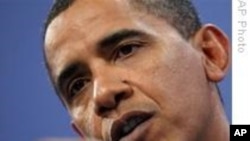On the 8th anniversary of the U.S.-led invasion of Afghanistan, President Barack Obama met behind closed doors with members of his national security team to discuss possible changes in strategy. This part of the strategy review is focused on neighboring Pakistan.
On October 7, 2001, then-President George W. Bush announced the start of the war in Afghanistan.
He spoke of the sacrifice ahead and made a vow.
We will not waver; we will not tire; we will not falter. And we will not fail," he said.
When Barack Obama became president this year, he announced a shift to a more regional approach to the conflict. He said the war in Afghanistan could not be won without taking on the terrorists and extremists operating in neighboring Pakistan.
"In the nearly eight years since 9/11 [September 11, 2001], al-Qaida and its extremist allies have moved across the border to the remote areas of the Pakistani frontier," said President Obama. "This almost certainly included al-Qaida's leadership - Osama bin Laden and Ayman al-Zawahiri."
Pakistan remains a key component of Mr. Obama's Afghanistan strategy, and it is receiving a great deal of attention as the White House conducts a strategy review.
Among those taking part in the closed door meetings is the head of the Central Intelligence Agency, Leon Panetta. In a recent VOA interview, he spoke about the links between Afghanistan's ousted Taliban regime and its supporters in Pakistan.
"Well, we think that they continue to receive encouragement from al-Qaida in Pakistan, and they continue to receive encouragement from the terrorists who are located in Pakistan and that because of that relationship, we view them very much as a threat to peace in Afghanistan," said Leon Panetta.
The president's top military and foreign affairs advisors were called to the White House on Wednesday for a three-hour, closed door meeting with Mr. Obama that dealt almost exclusively with Pakistan.
Moments before the session began, White House spokesman Robert Gibbs said the administration believes the Pakistan government is stepping up its efforts to deal with extremists.
"We have made through cooperation with the Pakistanis, great progress, in dealing with and downgrading and degrading al-Qaida," Said Gibbs.
Gibbs said he would not go into details, citing the need to protect sensitive intelligence information. But he hinted as to the agenda for the president's private meeting with his national security team.
"I think we will get into a firm analysis of where we are in Pakistan, the steps that have been taken by the Pakistani government through greater cooperation, but obviously steps in progress that have to continue to happen to continue to confront extremists in their country," he said.
Gibbs said the issue of whether to significantly increase U.S. troop levels in Afghanistan would not be addressed at the meeting. But he confirmed that the president has received a formal request for additional resources from the commander of U.S. forces in Afghanistan, Army General Stanley McChrystal.
News
On 8th Anniversary of Afghanistan War, Obama Continues Strategy Review
update

<!-- IMAGE -->



